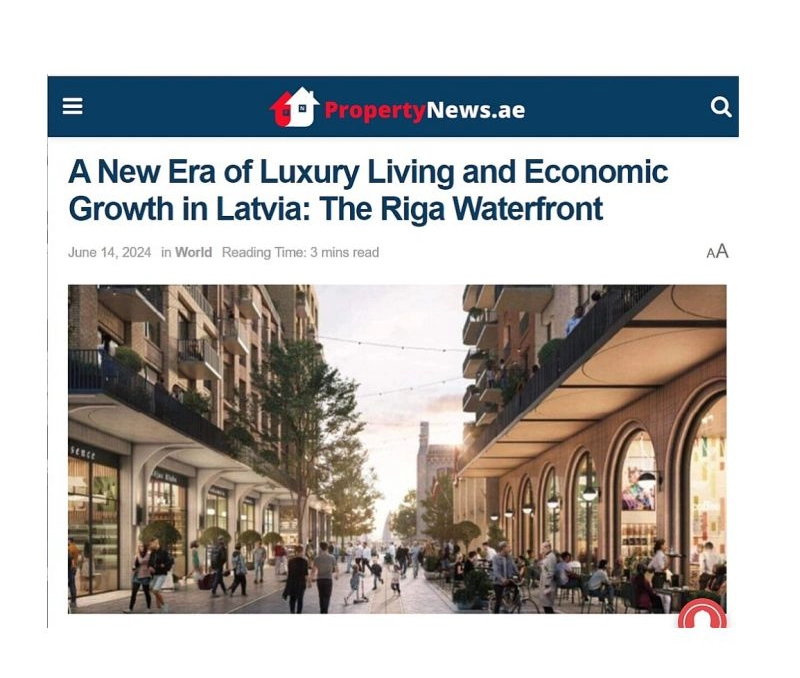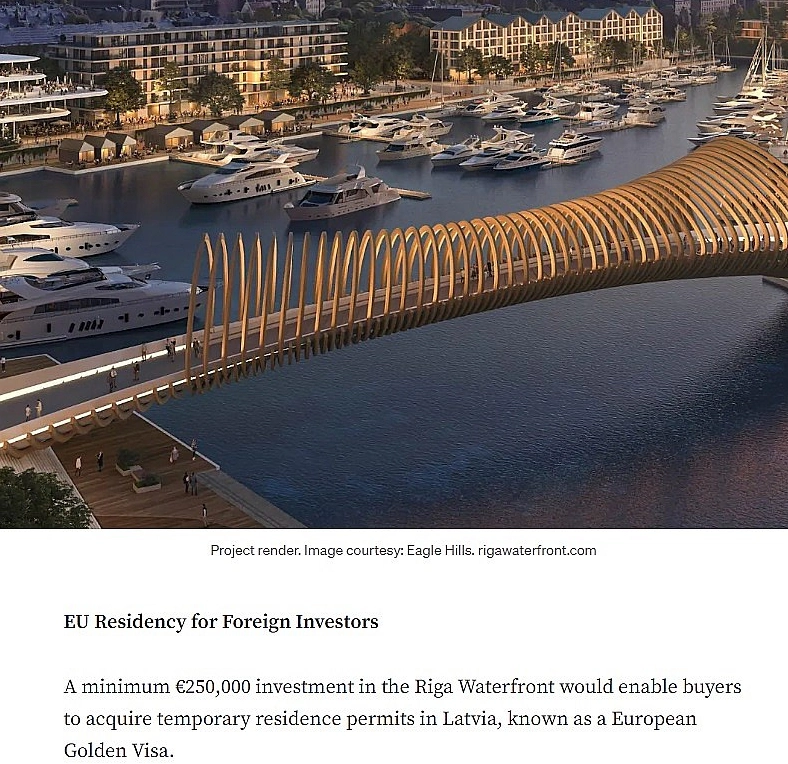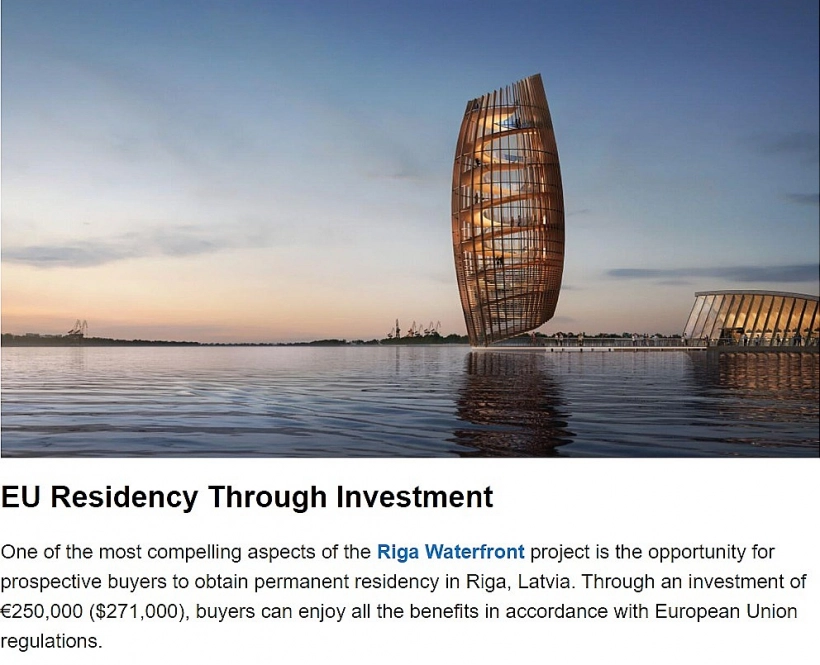Temporary residence permits are still here – more expensive, but still available
Raivis Šveicars, / Latvijas Avīze

Screenshot form property news.ae
At the end of May, the CEO of Eagle Hills, Mohamed Ali Alabbar, a citizen of the United Arab Emirates (UAE), various UAE ministers and members of the Saeima, including Ainārs Šlesers, opened the Riga Waterfront Andrejsala development project with a bang, promising to develop the area with apartments, hotels, schools and various other buildings, investing three billion euros in the project.
The money would come from Mohamed Ali Alabbar, while the land would be given by NĪ Holdings, the owner of the site, which is linked to Ainārs Šlesers, Andris Šķēle and Rietumu Bank shareholder Leonīds Esterkins. To recoup the investment, the authors of the project promise residence permits in Latvia to potential investors if they buy immovable property in the new project for at least EUR 250 000 in a large advertising campaign. Is there a second comeback for the infamous temporary residence permits (TRP)?
TRP issuance to be restricted
Vilis Krištopans, a member of Ainārs Šlesers’ party Latvija pirmajā vietā, a member of the Saeima and a future MEP, said in the debate on Latvijas Televīzija before the EP elections that they do not trade TRPs, but see them as one of the ways to attract investment. “We are not proposing to change anything, at the moment our laws allow [foreigners], excluding Russian and Belarusian citizens, to buy property or set up companies under the relevant rules in exchange for a residence permit. We offer investment, including European money, in our defence. We are not trading TRPs. A person sets up a company and is granted a TRP – that is not trading. If a person invests money, what is the ideology there? Whether it is an American, an Arab or a Frenchman. Investors do not come with ideology, they come with money,” said Vilis Krištopans.
But soon after, MEP Roberts Zīle announced that his proposal in May would change Section 5 of the Directive on the Prevention of Money Laundering, which would require Member States, where TRPs are in place, to change the policy structurally. The Directive entered into force at the end of May, but the amendments have not yet been published in the Official Journal of the European Union. The Directive states that TRP schemes present risks and vulnerabilities, in particular in relation to money laundering, evasion of EU restrictive measures, corruption and tax evasion, which could pose specific risks to the security of the EU.
In a conversation with Latvijas Avīze, Roberts Zīle said that his and his colleagues’ initial plan was to abolish TRPs in the EU altogether.
The plan even went through the European Parliament, was approved and voted on in plenary, but was later softened in negotiations between the European Parliament, the Council of Europe and the European Commission. Quite significantly softened, if we are talking about the original plan. Basically, the amendment only aims to tighten controls over the issuing of TRPs, for example by introducing a risk-based analysis for each TRP applicant. Roberts Zīle admitted that although the security services will have more resources and capabilities, it is likely that questionable persons will still have a way to get through the TRP selection system.
The amendments require Member States, where TRPs are in place, to notify the European Commission of the changes adopted to the granting of TRPs within four years. It is up to each Member State whether to tighten the TRP granting this year, next year or postpone the process until the last year – 2028. “It is important to change the law ourselves, because no country has become particularly rich from this. Nobody is stopping us from screening them more.
If it is allowed for Waterfront to make advertisements in Latvia, I suppose that all the Arab countries already have open advertising campaigns. We, as an opposition party, will try to end TRP, I do not know what the government will do,”
said Roberts Zīle.

Photo: Screenshot from rigawaterfront.eu
Previous amendments put on hold in the Saeima
In Latvia’s case, the action started earlier – in December 2022, the Ministry of the Interior submitted amendments to the Immigration Law to the Saeima for consideration, which planned to end the TRP programme, unless it was linked to an investment in a capital company. The amendments have been adopted in the first reading, the deadline for submitting proposals for the second reading was until April this year, following a suggestion by the Saeima Defence, Internal Affairs and Corruption Prevention Committee. However, these amendments are currently on hold until the autumn because of the changes to the EU Directive.
“With the changes in the European Parliament, there will also be a major revision of the amendments. Due to the heavy workload of the Commission, we plan to do this in the autumn. The Ministry of the Interior has also urged not to rush into this given the changes in Europe,”
said the Chair of the Commission, Raimonds Bergmanis (Apvienotais saraksts). He stressed, however, that temporary residence permits are likely to be terminated anyway. He justified this with a report by the Office of Citizenship and Migration Affairs (OCMA), which pointed out that the popularity of TRPs is already very low.
If the draft law were adopted in the preferred form, it would mean that it would become impossible to obtain a TRP by purchasing immovable property (as proposed by the Waterfront project). It would also no longer be possible to obtain a TRP if the applicant has credit obligations of at least EUR 280 000 with a bank registered in Latvia, or if buying government securities for at least EUR 250 000.
The Ministry also noted that foreigners who had obtained a TRP before the law came into force would be able to continue to apply for a temporary residence permit, provided that the investment object for which the permit was originally obtained continued to exist and the person continued to make payments under the Economic Development Programme. Basically, the principle of legitimate expectations will be respected on the part of the State.
The Ministry noted that the draft law was developed because it was found that TRP applicants mainly come from regions with unstable geopolitical situations, and high economic and political uncertainty.
Approximately 85% of TRP applicants come from the territories of the former USSR.

Photo: Screenshot from khaleejtimes.com
Applications are decreasing
It is already clear, however, that TRPs are no longer very popular, if comparing the current figures with those of ten years ago. In 2023, only 27 residence permits were issued, compared to 2250 in 2014. In 2014 and later in 2016, the Immigration Law was amended, including a number of new requirements, which reduced the number of TRP applicants almost tenfold. The last amendments were in 2022, essentially banning Russian and Belarusian citizens from obtaining TRPs. This reduced the number of TRPs issued by a factor of seven in two years.
All the amendments have led to a particular drop in the purchase of immovable property. The number of Russian TRP applicants, who used to dominate the list, has decreased significantly over the last two years.
According to the OCMA, historically, citizens from 70 countries applied for a TRP, with Russian citizens accounting for 65% of all applications.
No other country’s applications exceed 10%.
Looking at the investments made, in 2023, investments of EUR 10.4 million were made in Latvia for obtaining a TRP, an all-time low. The highest was in 2014, when TRPs were “sold” for EUR 447.4 million. In total, the TRP programme has invested EUR 1.62 billion between the second half of 2010 and the end of 2023, according to the OCMA report. 83% are related to transactions in the immovable property market. The majority of immovable property purchases took place in Riga and Pierīga.
According to the OCMA, as of 31 December 2023, there were 4412 investors and their family members with valid TRPs residing in Latvia.
